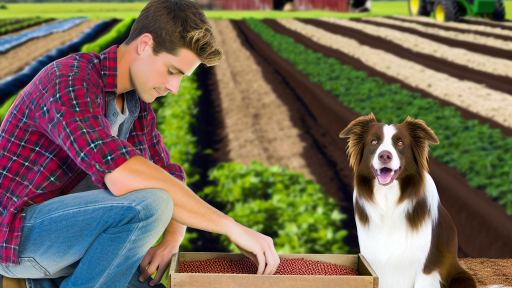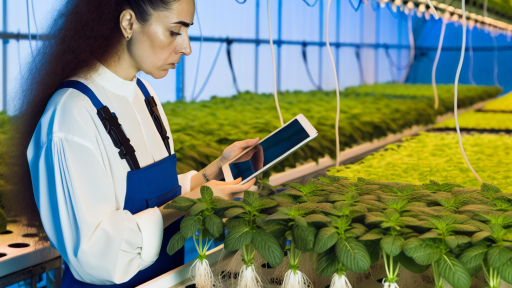Introduction to Sustainable Urban Farming
Importance of Sustainable Urban Farming
Sustainable urban farming is crucial for modern cities.
It addresses food security issues in densely populated areas.
Additionally, it reduces the carbon footprint associated with food transport.
Urban farming promotes local food production and consumption.
As a result, it strengthens community resilience and cohesion.
Benefits of Sustainable Urban Farming
Several benefits arise from implementing sustainable urban farming methods.
Firstly, it enhances access to fresh and nutritious food for urban residents.
Secondly, urban farming contributes to environmental sustainability.
It reduces waste through composting and promotes biodiversity.
Moreover, urban green spaces improve air quality and reduce urban heat.
Furthermore, urban farming creates green jobs and promotes economic development.
Community gardens help foster social interactions among residents.
In essence, sustainable urban farming provides both ecological and social advantages.
Key Principles of Sustainable Agriculture in Urban Settings
Encouraging Local Food Production
Sustainable urban farming emphasizes local food production.
This method reduces transportation emissions.
Transform Your Agribusiness
Unlock your farm's potential with expert advice tailored to your needs. Get actionable steps that drive real results.
Get StartedAdditionally, it fosters community resilience.
By sourcing food locally, cities can support their economies.
Utilizing Efficient Resource Management
Effective resource management includes using water wisely.
Urban farms often implement rainwater harvesting systems.
Moreover, utilizing composting techniques enriches the soil.
These practices minimize waste while enhancing productivity.
Promoting Biodiversity
Urban farming promotes biodiversity within city landscapes.
Incorporating various plants helps create healthy ecosystems.
Pollinators, such as bees, thrive in diverse environments.
This diversity supports pest control and improves yield.
Implementing Sustainable Practices
Urban farms embrace sustainable practices to enhance growth.
Crop rotation and intercropping are vital techniques utilized.
These methods improve soil health and reduce disease.
Additionally, organic fertilizers contribute to sustainable growth.
Building Community Engagement
Community engagement is essential for urban farming initiatives.
Farmers often organize workshops to educate residents.
This sharing of knowledge fosters a culture of sustainability.
Furthermore, community gardens encourage collaboration among neighbors.
Integrating Technology and Innovation
Technology plays a crucial role in sustainable urban farming.
Smart sensors help monitor soil moisture and conditions.
Vertical farming innovations maximize space usage.
Consequently, these advancements increase efficiency in urban environments.
Soil Health Management Techniques for Urban Farmers
Understanding Soil Health
Soi health is crucial for successful urban farming.
Healthy soil supports plant growth and agricultural yield.
Showcase Your Farming Business
Publish your professional farming services profile on our blog for a one-time fee of $200 and reach a dedicated audience of farmers and agribusiness owners.
Publish Your ProfileMoreover, it enhances the ecosystem’s overall balance.
Key Factors Influencing Soil Health
Several factors affect soil health significantly.
- Soil composition contributes to nutrient availability.
- Organic matter enriches the soil structure.
- Microorganisms enhance nutrient cycling in the soil.
Practices for Improving Soil Health
Urban farmers can implement various practices.
Organic Amendments
Adding organic matter improves soil fertility.
Examples include compost, manure, and crop residues.
These materials enhance soil structure and moisture retention.
Crop Rotation
Crop rotation helps maintain soil nutrient levels.
This practice prevents pest buildup and soil depletion.
Additionally, it promotes biodiversity in urban gardens.
Cover Cropping
Cover crops protect the soil from erosion.
They also improve soil organic matter and nutrient content.
Some common cover crops include clover and rye.
Monitoring Soil Health
Regular soil testing ensures nutrient levels are adequate.
Testing helps identify pH and organic matter content.
Furthermore, it assists in making informed amendments.
Community Engagement
Urban farmers can benefit from sharing knowledge.
Engaging with local farming groups enhances learning.
Collaborative efforts promote sustainable practices citywide.
Discover More: Hydroponic Systems For City Gardeners
Water Conservation Strategies for Urban Farming
Importance of Water Conservation
Water conservation plays a crucial role in sustainable urban farming.
It helps maintain healthy crops and protects local ecosystems.
Moreover, efficient water use reduces dependency on municipal supplies.
Implementing Rainwater Harvesting
Rainwater harvesting captures rainwater for irrigation purposes.
This method reduces the need for groundwater and municipal water.
Homeowners can install rain barrels or larger cisterns.
Additionally, integrating this system can enhance water sustainability.
Drip Irrigation Systems
Drip irrigation delivers water directly to the plant roots.
This method minimizes evaporation and runoff.
Farmers can save up to 60% more water compared to traditional methods.
Using timers and sensors can optimize watering schedules further.
Soil Moisture Management
Monitoring soil moisture levels is vital for efficient irrigation.
Farmers should regularly check soil conditions and moisture content.
Using mulches can help retain moisture in the soil.
Cover crops also improve soil health and reduce evaporation rates.
Choosing Native and Drought-Resistant Plants
Incorporating native plants can enhance water conservation efforts.
These plants are adapted to local climates and require less water.
Drought-resistant species contribute to lower water usage.
Urban farmers should research local flora for best practices.
Community Engagement and Education
Engaging the community in conservation practices enhances awareness.
Workshops and seminars can educate others on sustainable methods.
Showcase Your Farming Business
Publish your professional farming services profile on our blog for a one-time fee of $200 and reach a dedicated audience of farmers and agribusiness owners.
Publish Your ProfileSharing knowledge fosters collaboration among urban farmers.
Ultimately, it leads to better water management across the community.
Gain More Insights: Container Gardening Tips For Urban Farmers
Vertical Farming: Maximizing Space and Resources in Cities
Understanding Vertical Farming
Vertical farming is a modern method of food production.
This technique involves growing crops in vertically stacked layers.
It utilizes controlled environments to optimize growth conditions.
Moreover, vertical farms can operate in urban areas, near consumers.
This approach reduces transportation costs and carbon emissions.
Benefits of Vertical Farming
Vertical farming offers numerous advantages for urban agriculture.
- It maximizes land use in densely populated cities.
- Water efficiency significantly improves through recirculating systems.
- It eliminates the need for pesticides, promoting healthier produce.
- Crops can be grown year-round, regardless of weather conditions.
Additionally, these farms can create local jobs and stimulate economies.
Technologies Used in Vertical Farming
Vertical farms leverage a variety of technologies.
Hydroponics and aquaponics are popular growing methods.
These methods allow plants to grow without soil, using nutrient-rich water.
LED lighting plays a crucial role in enhancing photosynthesis.
Automation technologies streamline operations and reduce labor costs.
As a result, vertical farms can achieve higher yields efficiently.
Challenges of Vertical Farming
However, vertical farming also faces challenges.
- Initial setup costs can be quite high for urban farms.
- Energy consumption may rise due to artificial lighting.
- Market acceptance of vertically grown produce is still developing.
Despite these challenges, innovative solutions are emerging regularly.
Continuous research aims to enhance efficiency and address limitations.
Examples of Successful Vertical Farms
Various successful vertical farms demonstrate the potential of this method.
One notable example is AeroFarms in Newark, New Jersey.
Their system uses aeroponic technology to grow leafy greens.
Another example is Sky Greens in Singapore, which focuses on sustainable practices.
These farms showcase the feasibility of vertical farming in different contexts.
Learn More: Choosing The Right Containers For Farming Plants
Hydroponics and Aquaponics: Soil-less Growing Methods Explained
Understanding Hydroponics
Hydroponics is a method of growing plants without soil.
Instead, it uses a nutrient-rich water solution.
This technique allows for faster plant growth.
It also conserves water compared to traditional farming.
Many crops flourish in hydroponic systems, such as lettuce and tomatoes.
The system eliminates pests and weeds commonly found in soil-based farming.
Types of Hydroponic Systems
Several types of hydroponic systems exist for various needs.
- Nutrient Film Technique (NFT) circulates a thin film of nutrient solution.
- Deep Water Culture (DWC) suspends plant roots in oxygen-rich nutrient solution.
- Drip systems deliver nutrients through emitters placed at the base of plants.
Each system has unique advantages and challenges.
Exploring Aquaponics
Aquaponics combines hydroponics with aquaculture.
This method raises fish alongside plants in a closed-loop system.
Fish waste provides essential nutrients for plant growth.
In return, plants filter and purify the water for fish.
Aquaponics promotes a sustainable and symbiotic ecosystem.
Benefits of Aquaponics
Aquaponics has numerous advantages for urban farming.
- It produces both protein and vegetables in a compact space.
- This method significantly reduces water usage compared to traditional farming.
- Using natural bacterial systems eliminates the need for chemical fertilizers.
Such benefits make aquaponics an appealing option for urban agriculture.
Showcase Your Farming Business
Publish your professional farming services profile on our blog for a one-time fee of $200 and reach a dedicated audience of farmers and agribusiness owners.
Publish Your ProfileChallenges of Soil-less Methods
Despite their benefits, hydroponics and aquaponics present challenges.
Initial setup costs can be high for these systems.
Additionally, they require significant monitoring and management.
Failure to maintain proper nutrient levels can harm plant growth.
Nonetheless, the long-term sustainability often outweighs these concerns.
Explore Further: Maintaining Soil Health in Heritage Farms

Community Involvement and Education in Urban Farming Initiatives
The Importance of Community Engagement
Community involvement plays a vital role in urban farming initiatives.
When residents engage, they build a sense of ownership over local food systems.
This engagement fosters greater environmental stewardship in urban areas.
Moreover, it creates opportunities for collaboration and networking.
Educational Programs and Workshops
Educational programs enhance knowledge about sustainable practices.
Workshops offer hands-on training in essential farming techniques.
They also address topics such as composting, pest management, and crop rotation.
By participating, community members gain valuable skills and confidence.
Collaborative Projects with Local Organizations
Partnering with local organizations strengthens urban farming efforts.
Organizations can provide resources, funding, and expertise.
For instance, schools can implement garden programs for students.
Additionally, nonprofits can help with community outreach and awareness campaigns.
Creating Supportive Networks
Building supportive networks is essential for urban farming success.
Networks connect farmers, educators, and community members.
They facilitate information sharing and best practice dissemination.
Thus, everyone benefits from a rich exchange of ideas and experiences.
Promoting Food Security through Education
Urban farming education promotes food security in neighborhoods.
It teaches residents how to grow their own food sustainably.
Additionally, these initiatives help reduce reliance on external suppliers.
As a result, communities become more resilient against food crises.
Engaging Youth in Urban Farming
Youth engagement is crucial for future urban farming sustainability.
Involving young people instills a sense of responsibility towards food systems.
Educational programs designed for youth often focus on practical skills.
Hands-on activities can include planting, harvesting, and cooking.
Celebrating Urban Farming Achievements
Celebrating achievements helps maintain community enthusiasm.
Events such as harvest festivals can showcase successes in urban farming.
These events promote awareness and attract new participants.
Furthermore, they highlight the importance of sustainable practices.
Policy Support and Government Incentives for Urban Agriculture
The Importance of Supportive Policies
Government policies can significantly impact urban farming success.
Supportive regulations encourage more people to engage in urban agriculture.
Effective policies create a sustainable environment for growth.
Types of Government Incentives
Various incentives can promote urban farming initiatives.
- Grants help support start-up costs and operations.
- Tax breaks reduce financial burdens on urban farmers.
- Low-interest loans provide essential funding for development.
Examples of Successful Policies
Many cities have enacted policies favoring urban agriculture.
New York City’s GreenThumb program offers resources and support.
Showcase Your Farming Business
Publish your professional farming services profile on our blog for a one-time fee of $200 and reach a dedicated audience of farmers and agribusiness owners.
Publish Your ProfileChicago’s Urban Agriculture Ordinance facilitates local food production.
Community Engagement and Education
Engaging the community is vital for urban agriculture success.
Workshops and training encourage participation and knowledge sharing.
Collaboration with local nonprofits amplifies outreach efforts.
Challenges and Considerations
Despite positive efforts, challenges remain in urban farming.
Zoning laws may restrict land use for agricultural purposes.
Access to resources can be limited for new urban farms.
Future Directions
Future policies should adapt to emerging challenges.
Urban farming needs sustainable development strategies to thrive.
Innovation in technology can greatly enhance urban agricultural practices.
Challenges and Solutions: Overcoming Barriers to Sustainable Urban Farming
Identifying Common Challenges
Sustainable urban farming faces several significant challenges.
First, limited space constrains farming practices in urban areas.
Second, pollution impacts soil quality and crop health.
Additionally, access to fresh water is often restricted.
Finally, fluctuating economic conditions affect the viability of urban farms.
Innovative Solutions to Resource Limitations
Vertical farming offers a promising solution to space constraints.
This method optimizes small areas by stacking crops in layers.
Hydroponics and aquaponics use water efficiently for crop growth.
These techniques reduce the need for traditional soil-based farming.
Tackling Pollution Effects
To combat pollution, urban farms can use raised beds filled with clean soil.
Using organic practices helps mitigate harmful chemical impacts.
Additionally, planting cover crops can protect the soil from contaminants.
Ensuring Access to Water
Collecting rainwater provides an alternative water source for urban farms.
Using drip irrigation reduces water waste efficiently.
These measures ensure that farms maintain a consistent water supply.
Addressing Economic Barriers
Community-supported agriculture (CSA) models connect farmers with consumers.
This reduces marketing costs and supports local economies.
Grants and subsidies can further enhance the financial stability of urban farms.
Engaging the Community
Creating educational programs promotes awareness about sustainable practices.
Workshops help individuals learn practical urban farming techniques.
Moreover, building partnerships with local businesses strengthens the farming network.
Additional Resources
Urban Agriculture and Innovative Production | Home
FCS3378/FY1517: Social and Community Benefits and Limitations …




